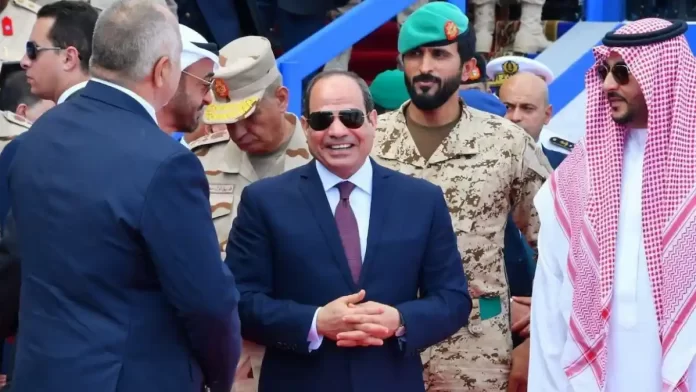Abdel Fattah El-Sisi, President of Egypt landed in Delhi on Tuesday, Jan 24, 2023. He will be the chief guest at India’s upcoming Republic Day celebrations on 26 January 2023.
As both India and Egypt are also celebrating the 75th anniversary of establishment of diplomatic relations this year, Sisi’s visit to India as republic day chief guest becomes significant.
It should be noted that during his Egypt visit in October 2023, External Affairs Minister S. Jaishankar referred to the “very good personal relationship” between Prime Minister Narendra Modi and President El-Sisi.
Here are five things you should know about the Abdel Fattah El-Sisi, the enigmatic Egyptian President who is said to enjoy a cult personality in Egypt.
His Early Life
Abdel Fattah El-Sisi was born and grew up in Gamaleya, a multi-ethnic quarter near the famous al-Azhar Mosque where Muslims, Jews and Christians lived together.
Recalling his experience later in an interview, he said that during his childhood, he had heard church bells and watched Jews flock to synagogue unhindered.
He later enrolled in the Egyptian Military Academy, and upon graduating he held various command positions in the Egyptian Armed Forces and served as Egypt’s military attaché in Riyadh.
President Sisi is married to his cousin Entissar Amer, and is the father of three sons and one daughter. One of his sons is married to the daughter of former Egyptian army chief Mahmoud Hegazy.
Role during the Egyptian Revolution
El-Sisi became the youngest member of the Supreme Council of the Egyptian Armed Forces in 2008.
Sisi was the youngest member of the Supreme Council of the Armed Forces (SCAF) during the Egyptian Revolution of 2011 and served as the director of military intelligence and reconnaissance department.
On 12 August 2012, Egyptian President Mohamed Morsi appointed el-Sisi as the new Defence Minister and he was subsequently described as a “Defense minister with revolutionary taste”.
Military Coup and Rise to Presidency
In June 2013, massive protests erupted in Egypt against President Mohamed Morsi.
Soon afterwards, the Egyptian Army issued a 48-hour ultimatum threatening to intervene if the government failed to resolve the disputes with protestors.
On 3 July 2013, Morsi was deposed by Egyptian Armed Forces in a coup d’état on charges of Muslim Brotherhood led Government “inciting violence and disturbing general security and peace.”
El-Sisi announced on television that the president had “failed to meet the demands of the Egyptian people” and declared that the constitution would be temporarily suspended, which was met by acceptance from anti-Morsi demonstrations and condemnation from pro-Morsi supporters.
After a few months of political manoeuvrings, Sisi took over as the President of Egypt on on 8 June 2014 in a presidential election conducted under military supervision.
Ideological and Geopolitical Leanings
Abdel Fattah El-Sisi comes from a religious family and frequently quotes Quranic verses during informal conversations. While at the War College, he even led Friday prayers at the local mosque.
Yet, as opposed to the deposed Muslim Brotherhood government that espoused global Islamic causes and welfare, El-Sisi on several occasions has shown nationalist and pan-Arab tendencies.
After deposing Mohamed Morsi in June 2013, Sisi had announced in a national broadcast that he “is committed in front of God to the Egyptian and Arab people” and that he “will protect Egypt, the Egyptians and their free will”.
Further, during a war anniversary celebrations few months later in October 2013, El-Sisi even called for the unification of all Arabs as he thanked “Egypt’s Arab brothers, who stood by its side.”
On 24 March 2014, an Egyptian court sentenced 529 members of the Muslim Brotherhood to death, an act described by Amnesty International as “the largest single batch of simultaneous death sentences seen in recent years anywhere in the world”.
According to Freedom House, President Abdel Fattah al-Sisi has governed Egypt in an increasingly authoritarian manner. Nevertheless, Sisi is said to enjoy a cult personality in Egypt.
Economic and Foreign Policies
Sisi undertook massive economic reforms after ascending to Presidency. In August 2014, he initiated a new Suez Canal, a parallel channel running about one-third the length of the existing waterway, which would double capacity of the existing canal from 49 to 97 ships a day.
Though, Sisi made an African tour immediately after taking office, the dispute between Egypt and Ethiopia over the Grand Ethiopian Renaissance Dam escalated.
With respect to Israel, Sisi has been described by the Economist as “the most pro-Israeli Egyptian leader ever”.
Under Sisi, Egypt also hosted the international donor conference in Cairo to raise 4 billion to reconstruct the Gaza Strip.
Relations between Egypt and Turkey have deteriorated significantly under Sisi. Turkey was the only country to call Morsi’s ouster in 2013 a coup, calling for the immediate release of Morsi and insisting he is the legitimate president of Egypt.
Erdoğan reportedly did not recognise Sisi as president of Egypt and called him an “illegitimate tyrant”.
On the contrary, relations between Egypt and Arab nations have improved under Sisi.
Though relations between Egypt and the United States became tensed after the overthrow of Mohamed Morsi, they have significantly improved since then.
Regarding Russia, both military and political relations between Egypt and Russia have also improved under Sisi.
